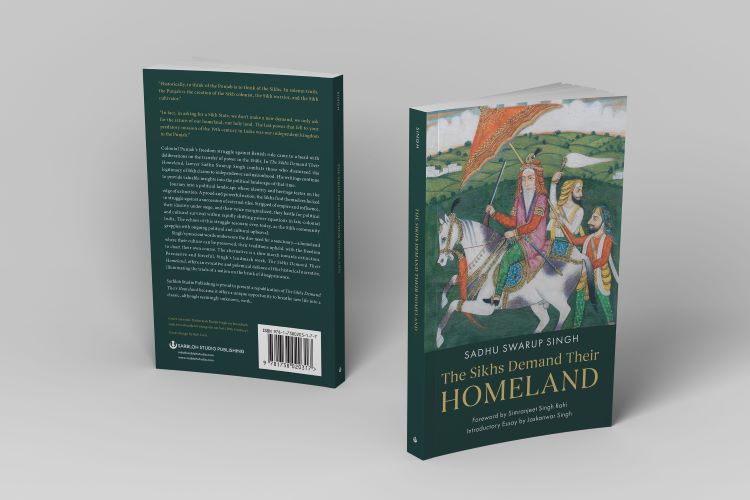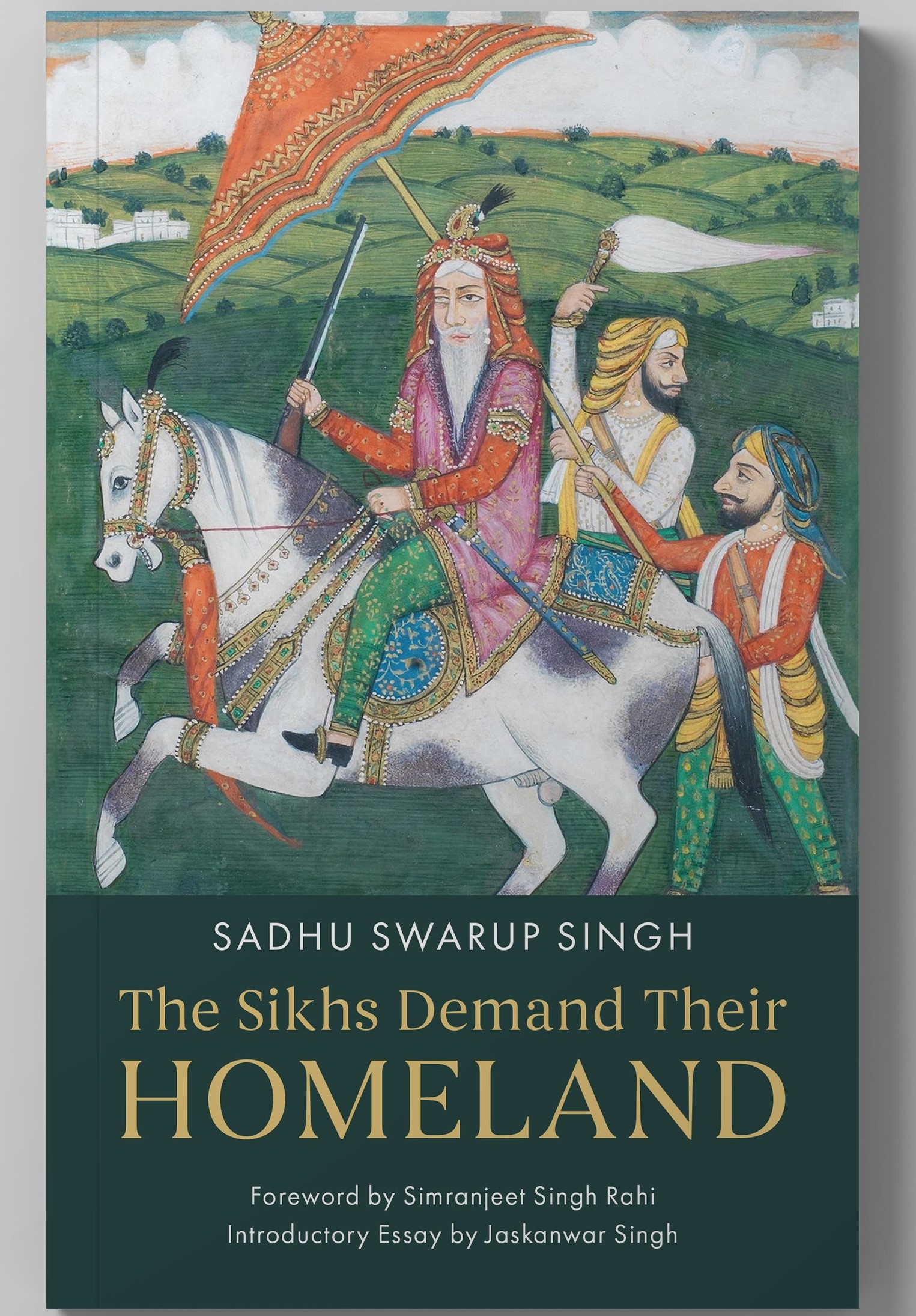
An Upcoming Republication of a 1946 Tract Detailing the Sikh Demand for a Homeland
The Punjab is the creation of the Sikh colonist, the Sikh warrior, and the Sikh cultivator
San Francisco
Sarbloh Studio Publishing has announced the re-publication of Sadhu Swarup Singh’s book ‘The Sikhs Demand Their Homeland’, because it offers a unique opportunity to breathe new life into a classic, although seemingly unknown, work.
Originally Published in 1946, the tract is one of the few surviving pieces of literature that give a first-hand account of the charged political climate. A release date for this book will be announced shortly.
“Historically, to think of the Punjab is to think of the Sikhs. In solemn truth, the Punjab is the creation of the Sikh colonist, the Sikh warrior, and the Sikh cultivator.”
“In fact, in asking for a Sikh State, we don’t make a new demand, we only ask for the return of our homeland, our holy land. The last power that fell to your predatory mission of the 19th century in India was our independent kingdom in the Punjab.”
Background
Colonial Punjab’s freedom struggle against British rule came to a head with deliberations on the transfer of power in the 1940s. In The Sikhs Demand Their Homeland, lawyer Sadhu Swarup Singh combats those who dismissed the legitimacy of Sikh claims to independence and nationhood. His writings continue to provide valuable insights into the political landscape of that time.
Journey into a political landscape where identity and heritage teeter on the edge of extinction. A proud and powerful nation, the Sikhs find themselves locked in struggle against a succession of external riles. Stripped of empire and influence, their identity under siege, and their voice marginalized, they battle for political and cultural survival within rapidly shifting power equations in late-colonial India. The echoes of this struggle resonate even today, as the Sikh community grapples with ongoing political and cultural upheaval.
 In fact, in asking for a Sikh State, we don’t make a new demand, we only ask for the return of our homeland, our holy land
In fact, in asking for a Sikh State, we don’t make a new demand, we only ask for the return of our homeland, our holy land
Singh’s prescient words underscore the dire need for a sanctuary— a homeland where their culture can be preserved, their traditions upheld, with the freedom to chart their own course. The alternative is a slow march towards extinction. Persuasive and forceful, Singh’s landmark work, The Sikhs Demand Their Homeland, offers an evocative and polemical defense of this historical narrative, illuminating the trials of a nation on the brink of disappearance.
Foreword
“Sardar Sadhu Swarup Singh in his popular booklet titled The Sikhs Demand Their Homeland, addresses the top-ranking representatives of the Britanic Majesty, with its publishing in 1946, coming shortly after all principal premier Sikh formations, namely the Shiromani Gurdwara Parbandhak Committee (SGPC), Shiromani Akali Dal (SAD), and the Chief Khalsa Diwan (CKD) supporting a demand for a Sikh State on March 22, 1946. A response to the Annual Conference of the Muslim League held in March 1940, Lahore, whereupon a demand for a sovereign Muslim State was made and that all areas in which they were in a majority be constituted into Pakistan which was becoming to the imminent creation, fruition, of the Islamic State of Pakistan…”
Simranjeet Singh Rahi is a locum optometrist in the day and archivist, historian at night. As the grandson of Giani Pritam Singh, erstwhile General Secretary of the Shiromani Akali Dal U.K. under the presidency of Jathedar Shingara Singh of Smethwick, England, he was inspired to dive deep into Sikh political thought and action. He was the founder-president of the Sikh Students’ Federation (Aston University) Branch, which sought to “arouse a political consciousness amongst members of the society,” with the hosting of educational seminars & conferences. He continues with his efforts towards this end; thus, he provides an in-depth, yet succinct context to this writing.
Introductory Essay
“It is impossible to miss the incisive exploration around cardinal themes of nationhood, political ascendancy, religious liberty, and the multifaceted nature of India’s diversity. Singh’s discourse probes the issues Sikhs face living in an incredibly diverse nation, challenging the concept of a singular, unified Indian nation. The poignant statement when referring to how the Indian National Congress is neither Indian nor National, “It could not be Indian first for the adjective Indian describes nothing… National it could not be in the face of there being so many nations in the country…” encapsulates this…”
Jaskanwar Singh is an independent scholar and Vidyaarthi at Bunga Azaadi (Institute for Azadist Studies), deeply interested in the intersections of Sikh philosophy, history, and politics. As the author of The Sikhs and the Prospect of Pakistan, he offers a unique exploration of Sikh politics leading up to the pivotal partition in 1947. He has deep affection for Punjab and Punjabiyat, and he spent time participating in, and documenting, the Kisan Morcha.
Appendices
For a better reading experience, Sarbloh Studio included extensive appendices. The republication of this book is dedicated to Sardar Darshan Singh Pheruman, therefore appendix A includes the speech of Sirdar Kapur Singh hailing him as the first Shaheed or martyr of the Sikh homeland. Additionally, Sohan Singh Seetal’s ballad in honor of Sardar Darshan Singh Pheruman’s martyrdom is included in the book. Vaar Shaheedi S. Darshan Singh Pheruman, published in the collection Seetal Vaaraan December 30, 1972, has been beautifully translated by Mahavira Singh.
Simranjeet Singh Rahi offered his help with the compilation and digitization of historical maps, photographs, and open-letters. Thus, appendix B will also offer supplemental material relating to the cause, Sarbloh Studio said in announcement.
__________________
Received the press released from Sarbloh Studio, a San Francisco-based art and publishing organization, through email on December 5, 2023